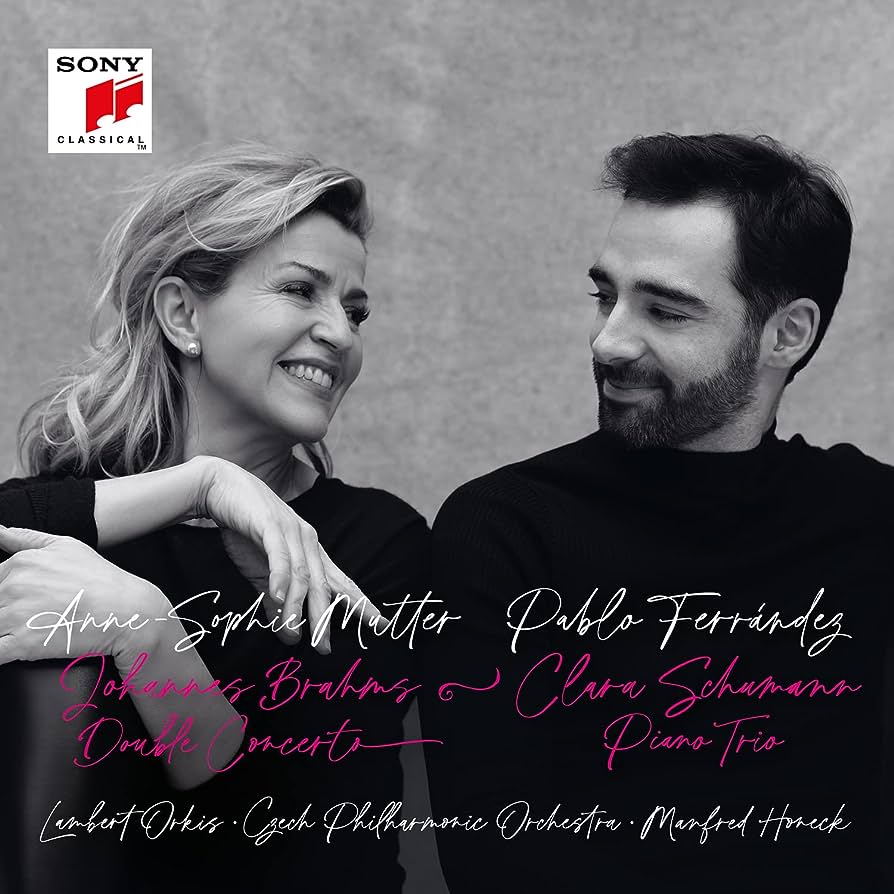Brahms Double Concerto · Clara Schumann Piano Trio – Anne-Sophie Mutter & Pablo Ferrández
Anne-Sophie Mutter presents a captivating reimagining of Brahms’ “Double Concerto” in A minor, featuring cellist Pablo Ferrández and the Czech Philharmonic, conducted by Manfred Honeck. Mutter enthusiasts might recall her previous recording of the same piece in the ’80s with Antonio Meneses and under the baton of Karajan with the Berlin Philharmonic. The album doesn’t stop at Brahms, also including Clara Schumann’s G minor piano trio with Mutter’s long-time chamber partner, Lambert Orkis.
In the realm of Brahms, intensity reigns supreme, extending even to the more subdued passages. The initial cello cadenza demands moments of musical conflict and struggle, attributes that Ferrández masterfully conveys. His nuanced vibratos infuse tenderness into his solos, creating achingly delicate moments. Mutter seizes her own opportunities to shine, particularly noticeable in her swift transformation from piano to a bold forte at 1’51”. The new interpretation adds a raw and poignant edge to the softer moments, setting it apart from her earlier rendition.
The third movement emerges as the pinnacle of the concerto. Ferrández’s bow mastery offers two distinct perspectives to his solo: a blend of resonance and buoyancy followed by a supple and satisfying sostenuto in legato passages. His slightly quicker tempo adds a dance-like quality to the theme, complemented by the smoother timbre of his cello compared to Meneses. Mutter’s entrance echoes the same material, highlighting her unique artistic personality. Both performers showcase meticulous attention to the composer’s textures and abrupt shifts in character.
Conductor Manfred Honeck seizes the orchestral interlude to sustain the momentum set by Mutter, infusing an almost urgent ferocity with string pushes that powerfully energize the movement. This fervor not only unifies the movement but also elevates the enthusiasm of the soloists. Ferrández could have offered a more distinct arrival in terms of color at the A major section, yet his performance maintains an engaging energy.
The album’s second half features Clara Schumann’s G minor trio with pianist Lambert Orkis. This segment falls slightly short of the first. The Allegro Moderato possesses dramatic and poignant elements inherent to Romantic compositions; however, more vibrant contrast and assertiveness are needed. Lyrical moments lack the required charm, partly due to a piano part that occasionally feels matter-of-fact. The slow third movement (Andante) fares better, with Mutter crafting beautiful lines and utilizing gradients of vibrato for an expressive touch.
While the sound engineering balances clarity with the two soloists’ presence in Brahms, excessive reverb slightly diminishes the ensemble’s power—a disappointment given the performance’s infectious energy. A few minor flaws do not detract from the overall enjoyable experience, particularly in the Brahms compositions. Anne-Sophie Mutter’s revisitation of the “Double Concerto” offers a fresh and emotionally resonant perspective, complemented by Pablo Ferrández’s skillful cello work and the vibrant collaboration of the Czech Philharmonic under Manfred Honeck’s baton.

